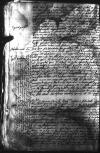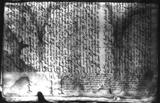Letter #5685
[Ioannes DANTISCUS] to [Samuel MACIEJOWSKI]Heilsberg (Lidzbark), 1539-06-24
English register:
Supporting the requests expressed in the [Royal Prussian] councillors’ open letter to the King [Sigismund I Jagiellon], Dantiscus asks the addressee for help in persuading the ruler to look more kindly than previously upon their wish regarding moving the Diet [of Royal Prussia] to St. Michael’s Day [September 29], and also to ensure that the opinion of the Prussian councillors is taken into consideration when dividing offices following the death of Ludwig von Mortangen (Mortęski), Castellan of Elbing (Elbląg).
He asks once again for help with achieving a positive resolution to the matter of Lake Drużno (Drausen), in which the Castellan of Gdańsk (Danzig) [Achatius von Zehmen (Cema)] is interested.
Dantiscus asks the addressee to defend him before those who are making him solely responsible for decisions made collectively by the [Prussian] councillors. He warns that if they have to write jointly to the King on every matter, the resultant delays will be detrimental to the ruler’s affairs and thus also to the state.
Dantiscus makes his excuses to Maciejowski for having used the hand of a scribe in his letter to him and the King, the reason being his impaired sight. He indicates that soon he and [Tiedemann Giese] will recount the reprehensible conduct they both experienced as bishops of Kulm (Chełmno) from the King’s subjects living there.
Dantiscus also expects the addressee’s help in connection with the spreading of Lutheranism among the elite in [Royal Prussia].
Manuscript sources:
Auxiliary sources:
Prints:
| ||||||||||||
Text & apparatus & commentary Plain text Text & commentary Text & apparatus
Reverende Domine, frater et amice carissime ac honoran(de) or honoran(dissime)⌈honoran(de)honoran(de) or honoran(dissime)⌉.
Salutem et fraterni amoris commendationem.
Quemadmodum paenultima Maii Dominationi Vestrae Reverendae cf.
De
Praeterea quid in novis et in aula agatur meque benevolentia sua prosequi non desinat. Qua me, rogo, contra eos tueatur, qui asserunt per me hic omnia fieri, quae ex communi fiunt consilio, quod quomodo habeat on the margin⌈quomodo habeatquomodo habeat on the margin⌉, in praesenti
Eandemque felicissime in diuturnitate vel Pylia[1] vivere et valere opto ex animo.
Dat(ae) or Dat(um)⌈Dat(ae)Dat(ae) or Dat(um)⌉
Postscript:
Quod manu mea serenissimae cf.
Scribet fortassis Dominationi Vestrae Reverendae reverendissimus
Quosdam de nostris, et qui de primis sunt, cepit inficere Luteranismus. Ii nisi reprimantur temporius, facile reliquiae satis ad hoc virus pronae subsequentur. Adiuvet Dominatio Vestra Reverenda, quantum potest.
Cuius fraterno amo paper damaged⌈[mo]mo paper damaged⌉ri me iterum commendo etc.


 AAWO, AB, D. 68, f. 279v
AAWO, AB, D. 68, f. 279v